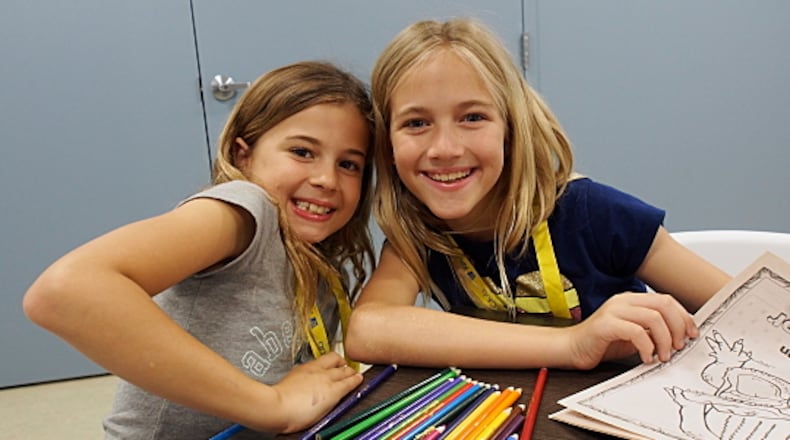The genesis of Kate's Club, an Atlanta-based nonprofit that helps children who have lost a parent or sibling, began when its founder lost her mother when she was 12 years old.
Founder Kate Atwood didn't know anyone else who had the same experience, and she wondered where she belonged with her grief.
"We're a culture that's taught to turn inward with grief and pain," she explained. "Grief is not the enemy. Unresolved grief is."
» RELATED: Camp Sunshine: A silver lining for kids and families
In order to reach out to kids in similar situations, she started Kate's Club in 2003 when she was just 23. It began when she held a fundraiser to take six kids bowling.
"It was simple and also that divine," she said, adding that it was important for kids to have fun and also be able to look across the room and know that others had gone through a similar experience.
Credit: Photo courtesy of Kate's Club
Credit: Photo courtesy of Kate's Club
"Our vision is a world where it's OK to grieve," Atwood added.
As the club began to help kids, she said she could understand why she had to go through the pain and loss of losing her mom.
"Sometimes your purpose is looking at what was taken away from you," she said.
Three things were important in the beginning and have remained an important part of the culture of Kate's Club, she added.
First, kids who have experienced the death of a parent or sibling need to know that they're not alone. Secondly, grief is a journey, and there's no timeline for it. And lastly, grief is not just sadness – it's everything combined. It's OK to laugh, smile or be angry, Atwood said.
In today's culture, we like for things to be OK, especially when it comes to kids. We have to be careful assuming that everything is fine, she said.
» RELATED: Five healthy ways to overcome loss and grief
"We need to treat emotional wounds as we treat physical wounds when it comes to kids," according to Atwood. That means that we shouldn't just ignore grief and assume that it gets better on its own.
For the past few years, Kate's Club has served about 1,000 to 1,500 children a year, executive director Theresa Prestwood said. The club has seen a 28% increase in applications this year and has added about 200 members in 2019.
Approximately 1 in 13 children in Georgia have lost a sibling or parent, which is an increase over the past few years. And Prestwood believes it may increase even more since the state probably hasn't seen the worst of the opioid crisis yet.
» RELATED: Bad day or childhood depression? Signs every parent should know
Kate's Club helps children in several different ways. It hosts Camp Good Mourning, and regular activities are also held for members in the clubhouse (although kids are members, a fee is never charged). In addition, a family night is held once a month so they can get together for therapeutic and recreational activities.
Grief affects everyone in the family, but they may not be communicating about it.
"We're trying to create those connections again for the family," Prestwood explained.
The club also offers KC Connects, a program with support groups, grief education and crisis response services that went to 29 different schools last year where a number of kids have experienced a death.
» RELATED: When students die, school counselors treat the emotional wounds
The nonprofit has a staff of eight but also works with over 200 different volunteers who help provide programming, Prestwood said. The volunteers are called "buddies," and they spend time helping on weekends or weeknights.
"Many of them have had a loss, and what we see is the buddies are building a community teaching kids and also learning from the kids," she said.
Some of the buddies previously participated in programs and eventually became volunteers.
Activities are an important part of Kate's Club since kids approach things differently than adults do, Atwood said. Adults may seek therapy first, but kids start out by doing group activities together. They may participate in music, arts, yoga or camp.
"The magic of Kate's Club is really community before communication," she said.
To learn more about Kate's Club, visit katesclub.org or call the organization at 404-347-7619. If you're the parent or guardian of a child who could benefit from the club's programs, you can fill out an online application.
You can also learn how to volunteer or help the organization through donations.
About the Author
More In This Series

